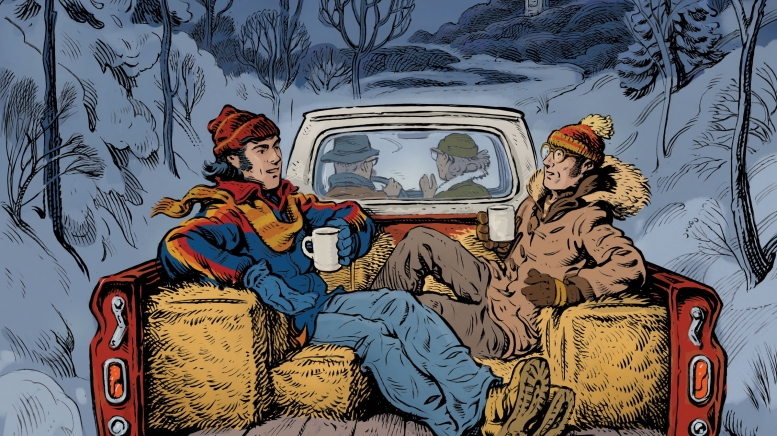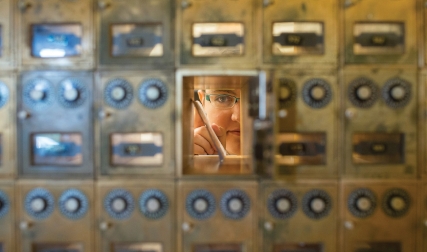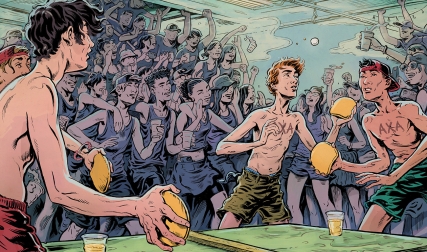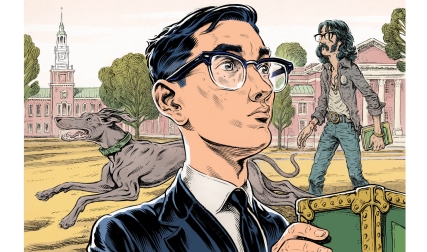I read that there’s been a post-pandemic uptick in the number of students hanging for a year or more near their colleges after they graduate, hoping for added security, confidence, and direction. Hey, I was a pioneer! Way back in the 1970s, this proved, for me, a pretty good way to go.
Barely an alum in 1976, I found an entry-level journalism job out on Reservoir Road, along my old tennis-team jogging route. A couple from Lyme, New Hampshire, Abbie and Don Penfield, had bought a monthly magazine, New Hampshire Profiles, and were hiring eager youngsters to juice their enterprise. I was young enough and cheap enough.
Suddenly back in town, I called my friend “Melon” to ask if I could crash wherever he was living. Melon—aka John Elsenhans ’74—was also a pioneer, working as a young associate in the College’s admissions office. “Sull! Welcome home!” said Melon, who was living in a dump he rented in Norwich and had a spare bedroom. Much later in life, working for a Huge Media Company in New York City, I would check in at Badrutt’s Palace in St. Moritz, Switzerland, but that did not excite me as much as Melon’s vacancy sign did. My options, I figured, were Melon’s place or the broken couch in Heorot’s tube room. My bedroom in Norwich at least featured a mattress on the floor. By the time I set forth from Hanover yet again I would be in the market for box springs.
At first, though, I was still a Dartmouth kid. Throughout the year I remained pretty much broke, so any after-work socializing was at Heorot, where beer was free. Tellingly, I, like Melon, started to feel a little weird hanging out downstairs with “the kids” and would, if anything, play a game of pool on the main floor rather than pong in the basement. Regular visits became Fridays only, then became none as I sensed that I was—I don’t know—a little out of time and place.
I was being eased into a next chapter. One midnight I was asleep when Melon banged on my bedroom door and bellowed, “The King is dead!” He certainly was. Elvis, fully lit by pharmaceuticals, had bought the ranch at Graceland. Clearly, no American could sleep on such news. I pulled on the 501s, and Melon drove us to the Tally House, where we sat into the wee small hours, eating chili and parsing the path from “Mystery Train” to “Burning Love” with the truck drivers. We weren’t drinking, but the next day at the office I was beat. I took note.
Although Melon had not yet become “John” to me (he now is, most days), we started meeting after work not at Heorot but at the squash courts. Melon had taken up the game. I grabbed a racket somewhere and learned the rules. Squash, of all fancy things. It was fun to say to others, “Maybe later? I have a squash date right after work.”
In the spring I wanted to get back to tennis, but no teammates were around. I wandered to the courts and spotted a guy who hit like I did. I introduced myself. He, who had nothing to do with the College, was named Bob. I said I was Bob, too. I did not say, “Call me Sully.” This “Bob” thing—this new me, as Bob—was a person I’d never portrayed on campus, but he was now apparently working in town and would soon be paying taxes. As, yikes, Robert.
Bob and Bob became regulars in the tennis community, even entering the end-of-summer tournament in 1977 and staying for snacks afterwards. I noticed English professor Jeffrey Hart and an art history prof whose name escapes me hanging around the courts. I nodded in recognition. I no longer worried about sucking up with comments about the Augustan Age or Winslow Homer’s aesthetic vs. whoever else’s.
Hanover became a different place. Most glaringly, it enlarged. What I mean is, the College was making the right noises about “outreach to the community,” and I am sure some conscientious sociology majors engaged in field trips. I’m equally certain the grander Dartmouth of today is devoted to being a benevolent upstanding Upper Valley citizen. I know as much from having attended President Sian Beilock’s roadshow in Manhattan last year, during which she answered that very question. But in the 1970s, the acreage between the river and the hill circumscribed pretty much the whole of Dartmouth life.
No one else at Profiles magazine was of Dartmouth, and in my new situation, which included reporting on all of New Hampshire, which is a very interesting beat, I was made aware of a wider world.
I remember the Christmas party. Don and Abbie hosted us at their hilltop spread and, after the milk punch was drained, ushered us into the hay-filled cargo beds of their pickups. On a crisp and cold evening, they drove us into the snow-filled countryside. They knew precisely where older individuals called “shut-ins” lived in family farmhouses. I’m betting Abbie and Don did the grocery shopping and bill-paying for many of these folks. On this night, we stopped here and there to sing, terribly, our short set of carols. A lone man or woman, or an old couple, would appear at the door. There were tears.
These steadings were all in Grafton County within a 15-mile radius of Baker Library, but, as a student, I hadn’t known of life out there. If the College had wanted me to know, I’m not sure of it. Dartmouth had done a pretty good job of keeping
me amused with bonfires, ice sculptures, and, at Spaulding Auditorium, a new kid named Springsteen. Now, however, my work focus and indeed my daily existence was convincing me that Dartmouth, my be-all and end-all in our neck of the woods, was but a pocket dimension within the larger solar system of the Upper Valley, outward into the multifarious galaxy that was New England and then further into the ever more complex omniverse of America and the Girdled
Earth and on and on into Deep Space Nine or Ten.
In late 1977, Don and Abbie sold Profiles to a printing company in Concord, New Hampshire, and we packed our bags.
I felt ready to go.




